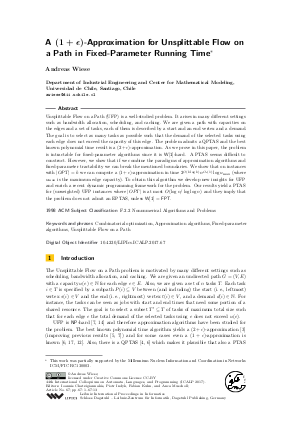A (1+epsilon)-Approximation for Unsplittable Flow on a Path in Fixed-Parameter Running Time
Author Andreas Wiese
-
Part of:
Volume:
44th International Colloquium on Automata, Languages, and Programming (ICALP 2017)
Part of: Series: Leibniz International Proceedings in Informatics (LIPIcs)
Part of: Conference: International Colloquium on Automata, Languages, and Programming (ICALP) - License:
 Creative Commons Attribution 3.0 Unported license
Creative Commons Attribution 3.0 Unported license
- Publication Date: 2017-07-07
File

PDF
LIPIcs.ICALP.2017.67.pdf
- Filesize: 0.51 MB
- 13 pages
Document Identifiers
Subject Classification
Keywords
- Combinatorial optimization
- Approximation algorithms
- Fixed-parameter algorithms
- Unsplittable Flow on a Path
Metrics
- Access Statistics
-
Total Accesses (updated on a weekly basis)
0PDF Downloads0Metadata Views
Abstract
Unsplittable Flow on a Path (UFP) is a well-studied problem. It arises in many different settings such as bandwidth allocation, scheduling, and caching. We are given a path with capacities on the edges and a set of tasks, each of them is described by a start and an end vertex and a demand. The goal is to select as many tasks as possible such that the demand of the selected tasks using each edge does not exceed the capacity of this edge. The problem admits a QPTAS and the best known polynomial time result is a (2+epsilon)-approximation. As we prove in this paper, the problem is intractable for fixed-parameter algorithms since it is W[1]-hard. A PTAS seems difficult to construct. However, we show that if we combine the paradigms of approximation algorithms and fixed-parameter tractability we can break the mentioned boundaries. We show that on instances with |OPT|=k we can compute a (1+epsilon)-approximation in time 2^O(k log k)n^O_epsilon(1) log(u_max) (where u_max is the maximum edge capacity). To obtain this algorithm we develop new insights for UFP and enrich a recent dynamic programming framework for the problem. Our results yield a PTAS for (unweighted) UFP instances where |OPT| is at most O(log n/log log n) and they imply that the problem does not admit an EPTAS, unless W[1]=FPT.
Cite As Get BibTex
Andreas Wiese. A (1+epsilon)-Approximation for Unsplittable Flow on a Path in Fixed-Parameter Running Time. In 44th International Colloquium on Automata, Languages, and Programming (ICALP 2017). Leibniz International Proceedings in Informatics (LIPIcs), Volume 80, pp. 67:1-67:13, Schloss Dagstuhl – Leibniz-Zentrum für Informatik (2017)
https://doi.org/10.4230/LIPIcs.ICALP.2017.67
BibTex
@InProceedings{wiese:LIPIcs.ICALP.2017.67,
author = {Wiese, Andreas},
title = {{A (1+epsilon)-Approximation for Unsplittable Flow on a Path in Fixed-Parameter Running Time}},
booktitle = {44th International Colloquium on Automata, Languages, and Programming (ICALP 2017)},
pages = {67:1--67:13},
series = {Leibniz International Proceedings in Informatics (LIPIcs)},
ISBN = {978-3-95977-041-5},
ISSN = {1868-8969},
year = {2017},
volume = {80},
editor = {Chatzigiannakis, Ioannis and Indyk, Piotr and Kuhn, Fabian and Muscholl, Anca},
publisher = {Schloss Dagstuhl -- Leibniz-Zentrum f{\"u}r Informatik},
address = {Dagstuhl, Germany},
URL = {https://drops.dagstuhl.de/entities/document/10.4230/LIPIcs.ICALP.2017.67},
URN = {urn:nbn:de:0030-drops-74154},
doi = {10.4230/LIPIcs.ICALP.2017.67},
annote = {Keywords: Combinatorial optimization, Approximation algorithms, Fixed-parameter algorithms, Unsplittable Flow on a Path}
}
Author Details
References
-
Noga Alon, Raphael Yuster, and Uri Zwick. Color-coding. J. ACM, 42(4):844-856, July 1995.

- Aris Anagnostopoulos, Fabrizio Grandoni, Stefano Leonardi, and Andreas Wiese. Constant integrality gap LP formulations of unsplittable flow on a path. In International Conference on Integer Programming and Combinatorial Optimization (IPCO 2013), pages 25-36, 2013. URL: http://dx.doi.org/10.1007/978-3-642-36694-9_3.
-
Aris Anagnostopoulos, Fabrizio Grandoni, Stefano Leonardi, and Andreas Wiese. A mazing (2+ε)-approximation for unsplittable flow on a path. In Proceedings of the 25th Annual ACM-SIAM Symposium on Discrete Algorithms (SODA 2014), pages 26-41. SIAM, 2014.

-
Nikhil Bansal, Amit Chakrabarti, Amir Epstein, and Baruch Schieber. A quasi-PTAS for unsplittable flow on line graphs. In Proceedings of the 38th Annual ACM Symposium on Theory of Computing (STOC 2006), pages 721-729. ACM, 2006.

-
Nikhil Bansal, Zachary Friggstad, Rohit Khandekar, and Mohammad R. Salavatipour. A logarithmic approximation for unsplittable flow on line graphs. In Proceedings of the 20th Ann. ACM-SIAM Symposium on Discrete Algorithms (SODA 2009), pages 702-709, 2009.

- Jatin Batra, Naveen Garg, Amit Kumar, Tobias Mömke, and Andreas Wiese. New approximation schemes for unsplittable flow on a path. In Proceedings of the 26th Annual ACM-SIAM Symposium on Discrete Algorithms (SODA 2015), pages 47-58, 2015. URL: http://dx.doi.org/10.1137/1.9781611973730.5.
-
Paul Bonsma, Jens Schulz, and Andreas Wiese. A constant-factor approximation algorithm for unsplittable flow on paths. SIAM Journal on Computing, 43:767-799, 2014.

- Gruia Călinescu, Amit Chakrabarti, Howard J. Karloff, and Yuval Rabani. An improved approximation algorithm for resource allocation. ACM Transactions on Algorithms, 7:48:1-48:7, 2011. URL: http://dx.doi.org/10.1145/2000807.2000816.
-
Amit Chakrabarti, Chandra Chekuri, Anupam Gupta, and Amit Kumar. Approximation algorithms for the unsplittable flow problem. Algorithmica, 47:53-78, 2007.

- Chandra Chekuri, Alina Ene, and Nitish Korula. Unsplittable flow in paths and trees and column-restricted packing integer programs. Unpublished. Available at URL: http://cs-people.bu.edu/aene/papers/ufp-full.pdf.
-
Chandra Chekuri, Alina Ene, and Nitish Korula. Unsplittable flow in paths and trees and column-restricted packing integer programs. In APPROX-RANDOM 2009, pages 42-55, 2009.

-
Chandra Chekuri, Marcelo Mydlarz, and F. Bruce Shepherd. Multicommodity demand flow in a tree and packing integer programs. ACM Transactions on Algorithms, 3, 2007.

-
Marek Cygan, Fedor V. Fomin, Łukasz Kowalik, Daniel Lokshtanov, Dániel Marx, Marcin Pilipczuk, Michał Pilipczuk, and Saket Saurabh. Parameterized algorithms. Springer, 2015.

-
Andreas Darmann, Ulrich Pferschy, and Joachim Schauer. Resource allocation with time intervals. Theoretical Computer Science, 411:4217-4234, 2010.

-
Michael R. Fellows and Neal Koblitz. Fixed-parameter complexity and cryptography. In International Symposium on Applied Algebra, Algebraic Algorithms, and Error-Correcting Codes, pages 121-131. Springer, 1993.

-
Fabrizio Grandoni, Salvatore Ingala, and Sumedha Uniyal. Improved approximation algorithms for unsplittable flow on a path with time windows. In International Workshop on Approximation and Online Algorithms (WAOA 2015), pages 13-24. Springer, 2015.

-
Fabrizio Grandoni, Tobias Mömke, Andreas Wiese, and Hang Zhou. To augment or not to augment: Solving unsplittable flow on a path by creating slack. In Proc. of the 28th Annual ACM-SIAM Symposium on Discrete Algorithms (SODA 2017), 2017. To appear.

-
Dániel Marx. Parameterized complexity and approximation algorithms. The Computer Journal, 51(1):60-78, 2008.

